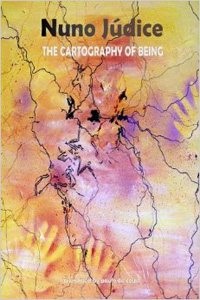Reviews
Poetry Review by David Swartz
Nuno Júdice, The Cartography of Being, translated by Paulo da Costa (Victoria: Livros Pé D’Orelha, 2012). Paperbound, 126 pp., $17.95.
 Nuno Júdice's poetry is dense, rich, lyrical and, above all, philosophical. It expresses a philosophy that equates poetry with every aspect of life, and a portrait of the poet in the act of self-creation through the making of poetry. In The Cartography of Being, Paulo da Costa's selection and translation of fifty-one of Júdice's poems written between 1967 and 2005, presented side by side with the Portuguese, captures the flow, rhythm, cadence, and overall meaning of the poet's original creations. Júdice is concerned with big metaphysical questions, the writer's craft, and the triumph of the world through art. His voice: deep, pondering, wilfully uncertain, projects profound enigmas and meandering journeys of thought. Like the bold sea-faring hands of Vasco da Gama at the helm of a ship, each of Júdice's poems sets out on an exploration of uncharted waters; without any solid land in view, he discovers the unexpected country contained within his own inward vision.
Nuno Júdice's poetry is dense, rich, lyrical and, above all, philosophical. It expresses a philosophy that equates poetry with every aspect of life, and a portrait of the poet in the act of self-creation through the making of poetry. In The Cartography of Being, Paulo da Costa's selection and translation of fifty-one of Júdice's poems written between 1967 and 2005, presented side by side with the Portuguese, captures the flow, rhythm, cadence, and overall meaning of the poet's original creations. Júdice is concerned with big metaphysical questions, the writer's craft, and the triumph of the world through art. His voice: deep, pondering, wilfully uncertain, projects profound enigmas and meandering journeys of thought. Like the bold sea-faring hands of Vasco da Gama at the helm of a ship, each of Júdice's poems sets out on an exploration of uncharted waters; without any solid land in view, he discovers the unexpected country contained within his own inward vision.
For Júdice, the intent and process of artistic creation is related to an act of love: “What matters is the meaning / of love that melds us.” In “Um Amor” Júdice describes love as an intimate internal relationship: “I drew near, and you, lifting my hand, / pulled me into your transparent / eyes as the sea floor the drowned.” Love, which begins with a “drawing near,” precipitates an act of creating distance within oneself, wherein the poet is awakened to an act of self-affirming, self-sustaining love: “[A]nd you, lifting my hand.” Responding to this amorous advance, the hand is lifted by the self-same lover who made the initial advance. Indeed, many of Júdice's poems allude to an immanent separation within himself. For example, in “Theory and Practice” Judice writes: “Yes: he created distance / between himself, the real being...love itself.” When one draws near to oneself, multiplicity grows into reality; recognizing one's essential pluralities, an internal dialectic emerges. Júdice objectifies his own subjective multiples, inventing a world projected by the internal dialectic of his own meandering hand in action.
Júdice's philosophy is nowhere as apparent as in “The Game of Questions” where he writes: “you are the one holding the board and the pieces / where we seek ourselves, though we found / ourselves, in the embrace where everything ends and begins.... I like these games where one knows who / will win. Me or you?... My / doubt is born from your certainty.” In Júdice's world, poetry presents a mirror reflecting the poet in the act of making poetry. This transcendental reflection uncovers new possibilities of meaning, while expressing the poet's fascination with the intermingling of identity with poetic creation.
The poet’s leap into multiplicity is connected to his wilful desire to give up certainty. In “Twilight,” for example, Júdice explores how the creation of poetic form is like putting form to uncertainty: “[U]ncertainty drops on the page and / seeps through the poem, until / it flows from my fingers / into my being.” While the metaphysical position of “uncertainty” echoes throughout this collection, it is the poet's task to “imprison it in the / sentence,” transforming the reality of chance into something as permanent as the poem. In “The Zodiac According to Saussure,” Júdice describes the eternity of the moment: “It is a life philosophy: to know / that time flies, and nothing that we failed to experience / will be recovered. Even so, I'll say that / one moment may contain all the time / we wish.” Then, in “Abruptly Appears, It Has Your Face,” we are presented with the paradoxical image of double-sided change; whereas real change involves the unseen infinity of perpetuating flux, the “face” of change itself presents only the one-sided illusion of stillness: “What is consecutive is lost / If time transforms beings and things / I feel the difference and feel spent. / The sun is a grammatical mistake.” The poem too must be transformed by time and change, and hence exists outside of the image: “the reality / of sound erases the illusion of a face.”
Júdice's task is to seek out the “image that will allow [him] to grasp the poem” (“Water Line, Line 4”) by dressing it in the language of images: “He sought a style—something to dress the / poem like an umbrella for rain or for / sunshine. He wanted to dress the language, the stanza, the verse, with the outlandish elegance of the tightrope walker.” While on one level such a dressing may seem superficial, in Júdice's poetics, it involves the very act of creating and sustaining the life of the world. Da Costa's translation is a testament to Júdice's profound depths of thought and unique aesthetic vision. The poems are beautiful and reveal exciting insights about how poems are made, and how the world is sustained by the act of poetry.
—David Swartz









